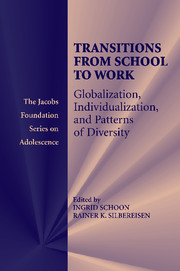Book contents
- Frontmatter
- Contents
- List of Illustrations
- List of Tables
- Contributors
- Acknowledgments
- I Introduction
- II Transitions and Global Change
- III Individual Decision Making
- 6 ‘It Was Not My Choice, You Know?’: Young People's Subjective Views and Decision-Making Processes in Biographical Transitions
- 7 From Paradigm to Paradox: Parental Support and Transitions to Independence
- 8 Job Attitudes and Job Aspirations in a Changing Labor Market: Germany, 1991–2006
- 9 Escaping the Gender Trap: Young Women's Transition into Nontraditional Occupations
- IV Mapping Diversity and Change
- V Interventions and Policies
- Index
- References
7 - From Paradigm to Paradox: Parental Support and Transitions to Independence
Published online by Cambridge University Press: 22 December 2009
- Frontmatter
- Contents
- List of Illustrations
- List of Tables
- Contributors
- Acknowledgments
- I Introduction
- II Transitions and Global Change
- III Individual Decision Making
- 6 ‘It Was Not My Choice, You Know?’: Young People's Subjective Views and Decision-Making Processes in Biographical Transitions
- 7 From Paradigm to Paradox: Parental Support and Transitions to Independence
- 8 Job Attitudes and Job Aspirations in a Changing Labor Market: Germany, 1991–2006
- 9 Escaping the Gender Trap: Young Women's Transition into Nontraditional Occupations
- IV Mapping Diversity and Change
- V Interventions and Policies
- Index
- References
Summary
Introduction
In the late modern age, there is an increasing tension between the global and the local, as commentators such as Bauman (1998) and Giddens (1990) suggest. This tension is apparent in the field of youth policy. Because national economies must compete on a world stage, they have to produce workforces suited to this global purpose. Because of global demographic changes in the age composition of societies, with a resulting imbalance to the ‘dependency ratio’, there is increased pressure on welfare states to reduce dependence on the state. The effect on young people is that they are expected to gain the qualifications needed nationally in terms of global competition and are seen as the main means of reducing the dependence which is associated with poverty and social exclusion, whether or not they share these objectives. The question, therefore, is whether globally driven economic policies, when translated into national education and welfare policies, can be sufficiently sensitive to local – even individual – concerns or whether the ‘local’ dimension will prove to be resistant to proposed governmental change.
This chapter is concerned with problems associated with the translation of policy into practice. Young people in the United Kingdom are now expected by policy makers to stay in education and training beyond the statutory minimum school-leaving age and, therefore, to defer their entry into the full-time labour market.
- Type
- Chapter
- Information
- Transitions from School to WorkGlobalization, Individualization, and Patterns of Diversity, pp. 145 - 164Publisher: Cambridge University PressPrint publication year: 2009
References
- 15
- Cited by

